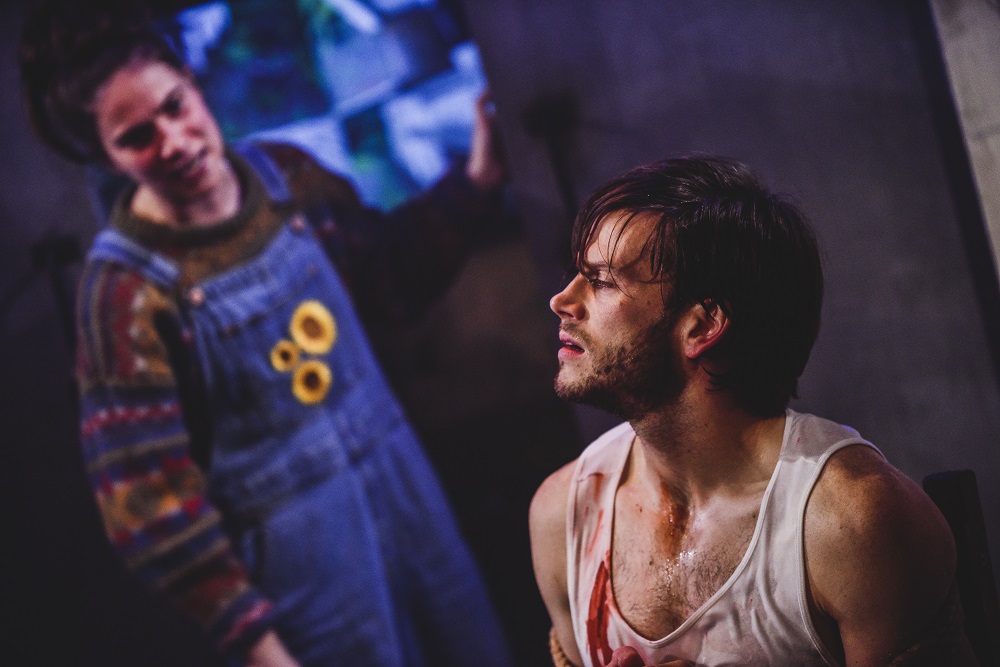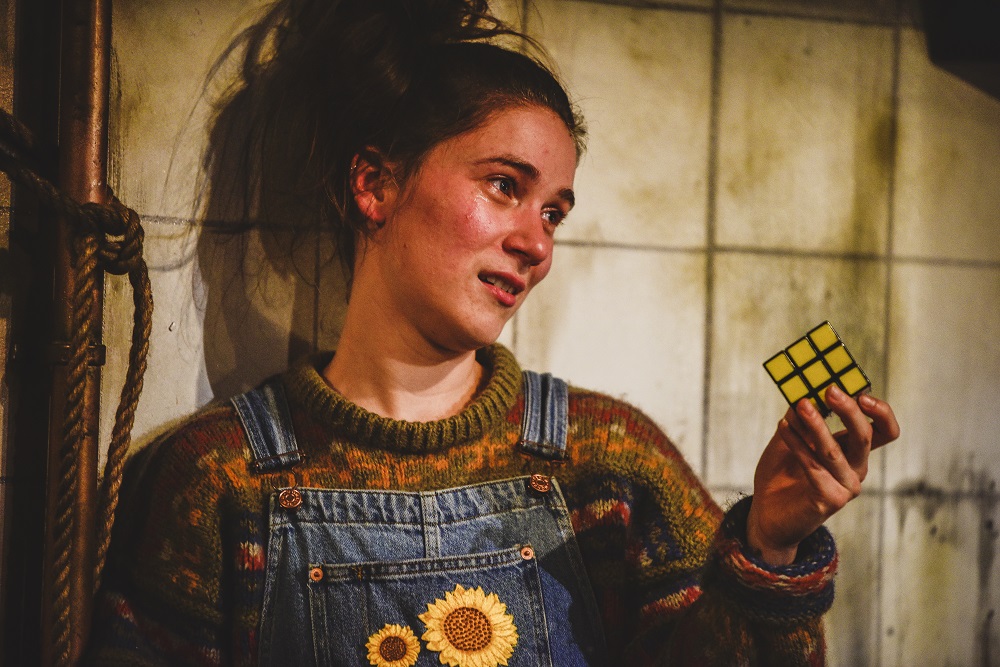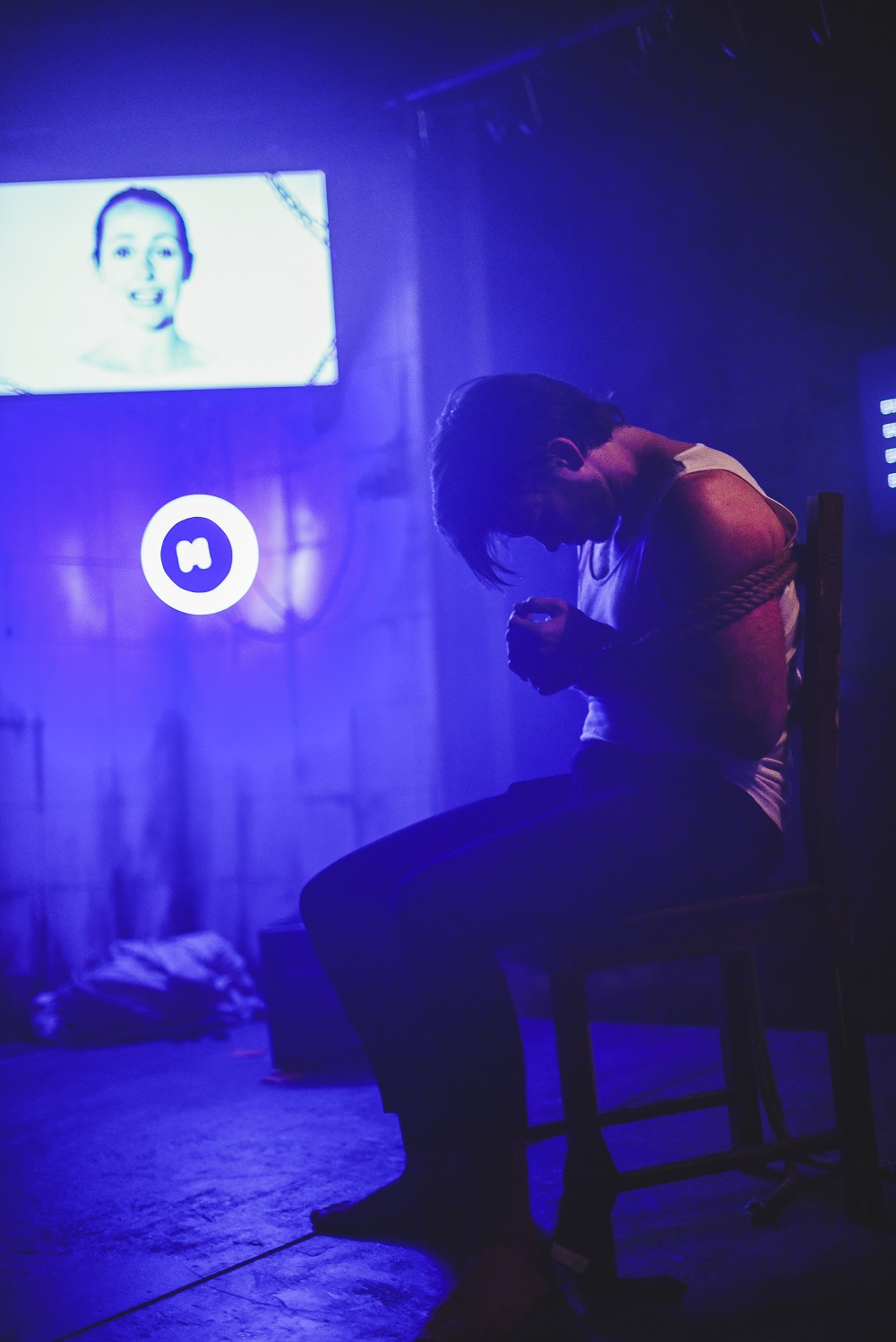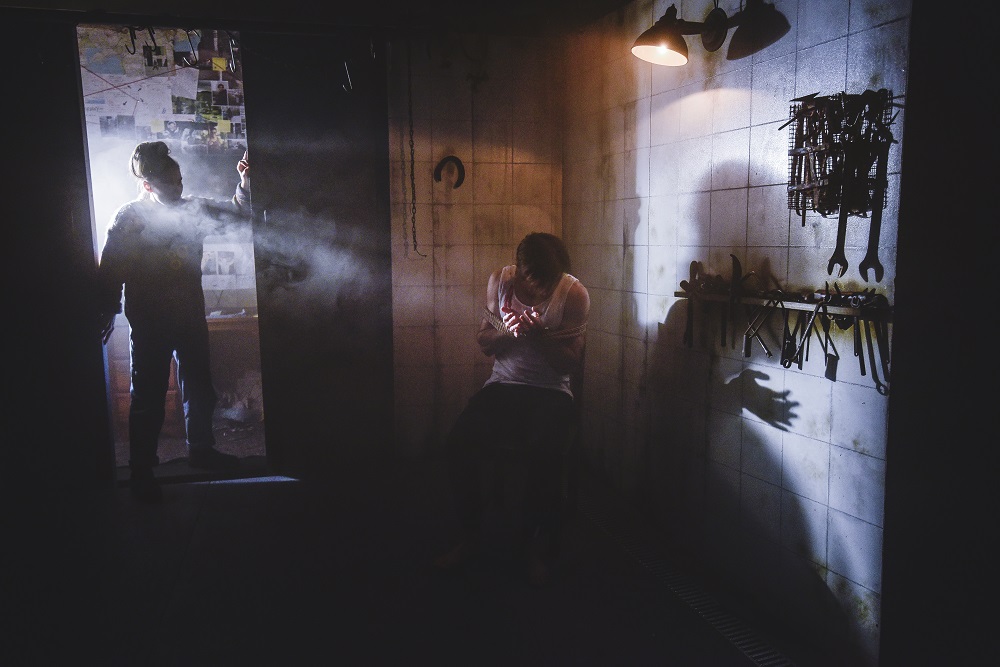Review: Hela demonstrates the creativity of bilingual theatre

Emily Garside
Hela by Mari Izzard rounds off The Violence Series at The Other Room. A series of three plays, interconnected thematically and all existing in the same ‘world’.
A gripping thriller of a piece, Hela is a ‘locked room drama’ in which the bigger picture issues we saw in the other plays in the series are boiled down to the experience of two connected people.
A tense and gripping piece of work condensed perfectly into a tight 65 minute running time, is an emotional, engaging piece that offers much to think of beyond its running time.

Commissioned through the Violet Burns Playwrighting Award, which in its inaugural year had the criteria of being awarded to a Welsh language playwright, Hela offers a bilingual piece of writing from a new playwright.
What Izzard (and director and AD of The Other Room, Dan Jones) have created is an accessible piece of bilingual theatre which means Welsh speakers of all (and no) levels can access any performance of the play. The bilingualism of the play is fully integrated, fully accessible and makes narrative sense.
It’s both the holy grail and what should be standard. The integration of translation into the narrative works for instead of simply alongside – or worse against- the narrative. The opening scene – in which Hugh doesn’t understand what Erin is saying, has elements of Brian Friel’s Translations about it – two people speaking their own language at each other, communicating somehow… and opening up an interesting discussion of language.
Izzard manages also to integrate commentary on the Welsh language, on pride and prejudice of language, without it being heavy handed.

The humour inherent in her writing also manages jokes about the Welsh language, Hugh’s failure to understand it, and the prejudices and challenges of language without falling on extremes of insults that some corners of social media often do when discussing language divide.
Instead, we get an honest and personal account of why Hugh’s own language ability is lacking. It might seem a small point, a simple plot point. But actually, for Welsh people who have grown up with limited knowledge of Welsh, for our own plethora of personal reasons, that felt like a real moment of being ‘seen and heard’.
For learners, or those with long ago forgotten Welsh, the recognition that there’s usually a story behind that, was incredibly touching, and in a bilingual play, feels truly important.
Accessible
And that aside, Hela demonstrates the creativity of bilingual theatre. The Other Room here are leading where other Welsh theatre companies – particularly the larger ones – are lagging, and failing to see the opportunity of and creativity in having a variety of language on stage. Why use one language when you can use two? Why restrict yourself to creativity in one language when you can do that in two, and by pulling them together find a ‘third way’ towards creativity.
Why when it seems so obvious that this works should we divide ourselves into ‘Welsh’ and ‘English’ when we’re a bilingual nation, and when the technology – and most importantly creativity – exists to make work accessible.

Pace
Mari Izzard has crafted a well-structured, gripping play that is as funny as it is disturbing. Working like a tightly structured hour of thriller television, the ‘locked in a room’ (literally) is perfect.
Izzard knows just how much information to deliver at a given time in order to keep the audience guessing, and most importantly, invested in the story. To say too much would be to spoil what is a brilliant ride in which things feel like they could constantly change. But the world in which Izzard places her characters feels real, and terrifying all at once.
Dan Jones’ direction serves Izzard’s writing well. With an eye for the visuals and pace, he keeps any ‘static’ elements of having a story set in one room with two characters, feel like it’s constantly moving at a breakneck pace. Again, Jones’ direction keeps the right level of ‘danger’ and ‘thriller’ to keep the audience guessing – and worrying – about what is coming next.
In that he knows to give space to his performers – and to Izzard’s writing. When scenes are driven by emotion, they are allowed to breathe, and the actors take the reigns, and this ability to know when to step back and let the words – and performers – do the work is a real strength of Jones’ direction.

Disturbing
The two-hander is both a gift and a mountain to climb for the two performers. In the first half Lowri Izzard as Erin dominates the stage. With her strange humour and at times bordering on manic energy she drives the piece. Pulling an audience along with eccentric charm, it’s difficult to look away from her.
And it is this charm that makes the depths of her performance even more resonant as the play draws to a close – Izzard pulls offers a raw, open and honest performance that also demonstrates the layers of this piece.
Similarly, Gwydion Rhys as Hugh gives a performance that both serves and highlights the complexities of this work. Initially the quieter role, Hugh feels like an observer, helping to unravel the word in which the story is situated. He’s an effective foil to Izzard’s humour and energy.
But as the play reaches its climax, Rhys demonstrates a complex, intriguing and ultimately disturbing performance. He’s been likable for 45 minutes, and yet as the revelations are unravelled, and his personality doesn’t on the surface change, Rhys manages to elicit elements of Hugh’s character that are disturbing, charming and believable.
It’s an almost deadly performance, and brilliantly executed – with his arms literally tied behind his back at times.

Terrifying
Hela is a tightly woven drama, that executes its narrative with engaging storytelling and pitch perfect dramatic pacing. Added to that the characters give it a human, emotional core that delivers an emotional as well as intellectual punch, both incredibly human, and offering a set of difficult to approach, let alone answer, set of questions about our world.
When the revelations come it’s an uncomfortably familiar story – albeit with additional layers which take it to a level of disturbing which is uncomfortably easy to believe. To reveal too much would be to spoil what is a tightly woven build of dramatic tension and revelation.
All of The Violence Series were terrifying in different ways. American Nightmare in the ‘big picture’ sense. The idea of the world crumbling around us as we watch. The Story in the ‘it could happen to me’, news story reflected back on us manner. And Hela in the sense of the stuff of nightmares hiding in plain sight.
All are terrifying stories in their own right. But they unite to paint a picture of a not-to-distant world in which all our nightmares are real. And for want of a few specifics, it is real, and that’s what makes all three stories terrifying.
In crafting this series, The Other Room has achieved something remarkable theatrically for sure- an ambitious and brilliantly executed project- but also something in a humanistic sense.
In offering stories that hold a mirror up to our world – on both the marco and micro level. In stories that haunt audiences – rightly so – long after leaving the space. And stories that give pause for thought – but hopefully also discussion.
That’s a theatre recognising both what they’re capable of theatrically, and what they’re capable of in terms of what theatre can do. And that’s a powerful and important thing.
Hela was first performed at The Other Room, Cardiff from 05/11/2019 – 24/11/2019. It was commissioned through the Violet Burns Playwriting Award and produced as a part of The Violence Series.
Support our Nation today
For the price of a cup of coffee a month you can help us create an independent, not-for-profit, national news service for the people of Wales, by the people of Wales.





